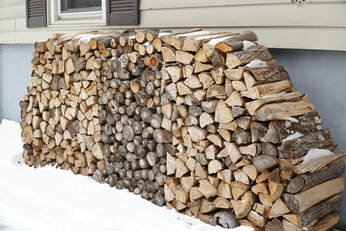 Sitting around a wood burning fire has its appeal. The bright flames, glowing wood, and warmth create a distinct experience. Though, this pleasing experience can rapidly turn unpleasant under incorrect conditions. Using unseasoned wood instead of seasoned wood could ruin an impeccably good fire. What are the differences between seasoned & unseasoned firewood? To be seasoned is to be dry. Wood that has been newly cut has quite a bit of water. Nearly half its weight is water. This sort of wood is deemed unseasoned and burning it can be difficult since wet wood smokes a lot and doesn’t burn well. On the other hand, seasoned wood has been stacked, split, and stored in a dry area. Softer woods, such as spruce or pine, can be seasoned in around six months. Hardwoods like oak will season in about two years. Seasoned wood necessitates more effort and time to prepare which is why business offering tree services typically charge a little more for it. The Problem with Burning Unseasoned Wood The first hardship you’ll encounter when burning unseasoned wood is the problem in start burning the fire. Water won’t catch on fire. Since it makes up almost half the weight of the wood, it dramatically affects the lighting process. Even if the wood does catch, the fire needs constant care to make sure it doesn’t go out and adding any new logs might snuff all the hard work you put into lighting it. Seasoned wood doesn’t cause any of these issues, producing an enjoyable, natural fire. Next, the burning unseasoned wood creates a large amount of smoke. The fire has to vaporize the water as it burns in the wood. Therefore, the smoke is packed with water vapor that hurts the respiratory tract when inhaled. Also, the smoke contains a large concentration of creosote. Also, unseasoned wood doesn’t create as much heat as seasoned wood. For those depending on the fire to heat their homes, using unseasoned wood only creates a cold night. Wet wood burns at a cooler temperature since much of the heat of the fire go for evaporating away the water instead of burning the wood. On the other hand, seasoned wood has minimal or no water, so it burns quite hot. When you're ready to have some trees cut down for firewood, contact a tree removal company to get your trees evaluated and cut down for you. Comments are closed.
|
© Tree Service York PA 2016-2020
Leaders Heights | Jacobus | Emigsville | Mount Wolf | Manchester| Marietta | Bainbridge | Wrightsville | Dallastown |Windsor | East Prospect |York Haven | Red Lion | Dover | Loganville | Seven Valleys
Tree Service York PA
2536 Eastern Blvd #102
York, PA 17402
(717) 216-4888
2536 Eastern Blvd #102
York, PA 17402
(717) 216-4888
